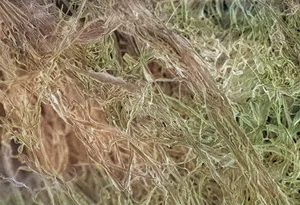A unique production method
Cellulose is the Earth’s most abundant and widespread natural polysaccharide, commonly found in plant cell walls, algae or synthesised by certain bacteria. “I chose cellulose as a research object because of its natural origin and favourable properties: its biocompatibility and degradability, variety of chemical strains, and wide range of applications,” says the inventor.
The invention was developed using the wet-type electrospinning method, whereby cellulose is dissolved in special solvents – ionic liquids – and the solution is then converted into fibres. “This is a method that allows the creation of cellulose matrices with a unique gel-like structure, similar to cellulose fibres naturally synthesised by bacteria,” says the PhD student at the KTU Faculty of Chemical Technology (CTF).
This method of creating cellulose has an advantage in the market due to its environmental friendliness. In particular, the dissolution method used is more environmentally friendly due to the use of “green solvents”.
Also, the raw material for this production process can be either raw cellulose or cellulose waste. Depending on the purity of the material, the resulting fibre can be used for different products. The recycled cellulose can be used to produce new polymer composite products such as toys, sports equipment, household items. If the raw material is pure plant cellulose, biomedical applications have great potential, where this type of nanofibrous structure has unique biocompatibility properties.
A significant boost for cancer research
“Our invention – a nanofibrous cellulose matrix – is like a scaffold, a structural support that helps cells to divide and grow,” explains Pauliukaitytė.
The biocompatibility mentioned by KTU scientist Pauliukaitytė is very important in tissue engineering to avoid the living organism’s immune response to a material used for cell reproduction other than the one naturally synthesised by the organism.
“In addition, cellulose has very favourable mechanical properties, so that the fibres developed are strong and can withstand the high stresses that arise when cells proliferate. Since cellulose absorbs water, the use of cellulose fibres in wound healing can control the amount of moisture that occurs during the healing process,” says Pauliukaitytė.
So far, the applicability of cellulose in tissue engineering has been tested for the reconstruction of cartilage, bone and vascular structures. However, given the biocompatibility, structural and moisture retention properties of cellulose, this polymer has great potential for use in regenerative medicine, which aims to stimulate the body’s natural recovery mechanisms and restore lost biological functions, and for organ growth.
In addition, the cellulose nanofibres developed are not only biocompatible and environmentally friendly, but also have the potential to form three-dimensional (3D) cell models that better reflect cell behaviour in the natural environment. “This is a significant advantage, especially in tissue engineering and cancer research, as 3D cultures allow for more precise experiments and a better understanding of cell growth and interactions,” says Pauliukaitytė.
The article Regenerated nanofibrous cellulose electrospun from ionic liquid: Tuning properties toward tissue engineering was published in Journal of Biomedical Materials Research Part A, and can be accessed here.



